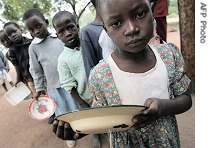2007年VOA标准英语-Zimbabwe's Children Enter New Phase of Hardship(在线收听)
Geneva
16 July 2007
The U.N. Children's Fund says the children of Zimbabwe have entered a new phase of hardship. UNICEF says millions of children are missing out on their most basic needs because of a severe drought and the dramatic deterioration of Zimbabwe's economy. Lisa Schlein reports for VOA from Geneva.

Zimbabwean children wait for food at Masarira primary school, for some it is the only meal they will have in the day, said headteacher Zvinavashe Takabvirakare (File Photo)
UNICEF says the unprecedented hardship facing Zimbabwe is biting particularly hard among the children. It says quality health care in the country's schools has all but collapsed. It says severe drought, the worsening economy, reduced food production, and high unemployment are causing people to leave their homes.
UNICEF Emergency Programs Director Dan Toole says families are forced to cut back on the most basic daily needs.
"What we know in Zimbabwe is that malnutrition is growing rather radically. Twenty percent of the population currently needs food assistance and that food assistance is quite hard to get in," said Toole. "We expect that number to double in the next six months. There is a shortage of medicines. There is a shortage of doctors and nurses. And, thus, the health care system has been devastated, with 50 percent of all health-care positions now vacant."
Official statistics show inflation in Zimbabwe has soared to more than 4,500 percent and the unemployment rate is 70 percent. Price controls have resulted in shortages of the most basic commodities, such as sugar, salt, meat, and flour.
Another problem is HIV/AIDS. UNICEF's Dan Toole says just six percent of children in need of anti-retroviral drugs have access to them. He says UNICEF has received virtually no money to carry out its ongoing HIV prevention programs.
Toole says many of the country's more than 1.5 million orphans have lost their parents to HIV/AIDS and some are also infected with the virus.
"It is likely children who are infected by HIV/AIDS and who are also orphans are likely to die with no access to anti-retrovirals," he added. "The second reason I think HIV orphans are the most vulnerable and indeed are potentially likely to die is that they are indeed the most vulnerable. They do not have a parental support mechanism. They do not have necessarily the community support and with 4,500 percent inflation and unemployment, even their alternate caretakers are absent."
UNICEF reports Africa is the continent with most of the world's so-called forgotten emergencies. These are crises that do not attract much public attention and, are chronically under-funded.
These countries include Southern Sudan, Chad, the Ivory Coast, Central African Republic and now Pakistan, with the recent floods.
UNICEF also includes Iraq within this list. It notes Iraq gets a lot of political attention. But, when it comes to humanitarian needs, it says Iraq is forgotten. To date, UNICEF says it has received no money from international donors with which to carry out its life-saving programs for children and women.